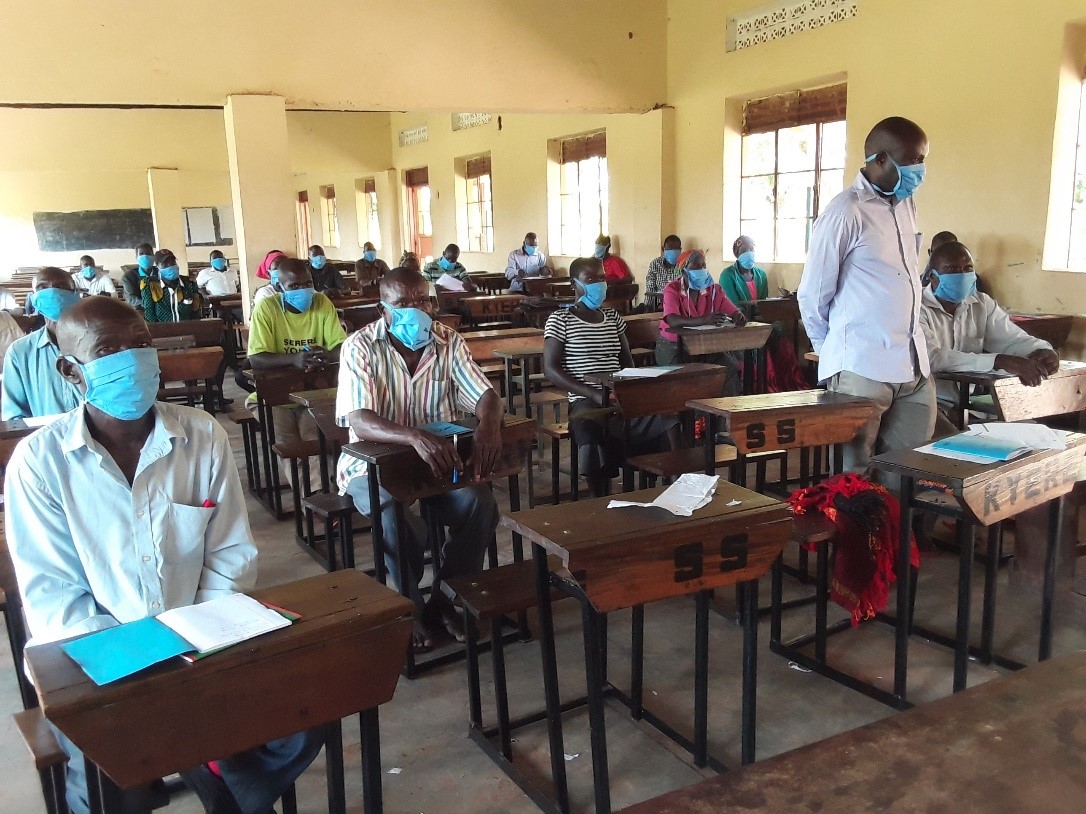PMI Continues Malaria Control Interventions in Uganda during COVID-19 to prevent further strain on health systems
Around the world, countries are grappling with the COVID-19 pandemic while also trying to maintain health services to protect people from life-threatening diseases, such as malaria. In Uganda, where malaria is endemic, the government put in place strict lockdown measures to slow down the COVID-19 pandemic. Measures included a shutdown of public transportation, a limit on the number of people in private vehicles, a nightly curfew and a limit on the number of people gathering together. While these measures aid in the prevention of the spread of the novel coronavirus, there was also a temporary halt to critical malaria prevention services, such as indoor residual spraying (IRS).
To reduce the burden of malaria in Uganda, the United States President’s Malaria Initiative (PMI) VectorLink Project in collaboration with Uganda Ministry of Health (MOH) National Malaria Control Division (NMCD) implements IRS to kill mosquitoes that transmit the disease in 16 high-burden districts to protect approximately 4.7 million people. In April 2020, the nationwide lockdown delayed the start of the project’s second phase of IRS in eight districts (Serere, Kaberamaido, Kalaki, Amolatar, Dokolo, Lira, Alebtong and Otuke). The project completed its first phase before the lockdown, protecting 2.9 million people.
To ensure continuity of malaria prevention measures, the project worked closely with the MOH, NMCD, partners and stakeholders and received clearance from government of Uganda leadership to continue implementing IRS amid the lockdown with strict protocols in place. The project worked closely with local government leaders through the District COVID-19 taskforce and District IRS taskforce to implement quality IRS. The project leveraged the coordination of both taskforces, including community mobilization platforms already in place for COVID-19 at district, sub county and village levels. The Local Council Chairpersons served as key IRS mobilizers while holding security/ coordination responsibilities as the COVID-19 focal points at the village level.

In addition to the standard personal protective equipment provided to spray operators, the project provided face masks for all training participants and facilitators, portable handwashing facilities at entrances to all training rooms, and hand sanitizers at operational sites, all while observing the recommended number of people per gathering to embrace social distancing. Training was conducted in small teams of 10 participants in large halls or classrooms with facilitation from the District Health teams and trainers from other districts.
At operation sites, the project posted posters and flyers indicating signs, symptoms and prevention measures for COVID-19 and incorporated COVID-19 mitigation strategies in all training materials. On May 25th VectorLink Uganda successfully started its second phase of IRS, and by June 20th, the project had sprayed approximately 1.4 million structures over the two spray phases, protecting a population of about 5 million people including 132,089 pregnant mothers and 950,163 children under five years.
Mr. George Edward Onya, the Resident District Coordinator (RDC) of Kaberamaido District during an IRS planning meeting said, “COVID-19 transmission is yet to take hold so let us fight malaria now so that by the time COVID-19 arrives our facilities will not be congested with malaria cases and our frontline workers will have the time and resources to fight COVID-19.” He further noted that PMI VectorLink Uganda was quite exemplary in implementing IRS amidst COVID-19 and achieving high coverage, which will go a long way in preventing malaria transmission in the district.

